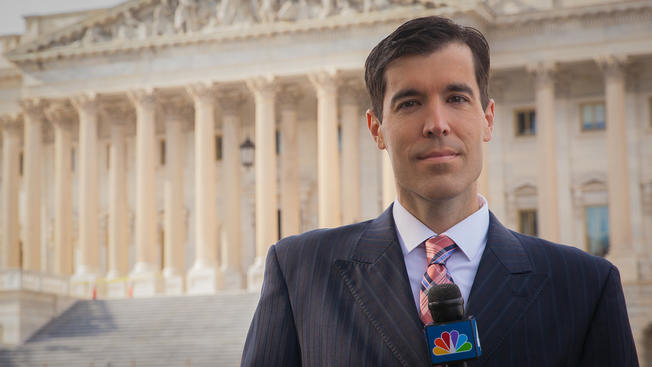Ten thousand hours of security camera footage. Six hundred and fifty-seven defendants. Dozens of guilty pleas. It’s been more than ten months since the January 6 insurrection at the United States Capitol changed the way we think about our democracy. And yet, from the perspective of the federal prosecutors working around the clock to conduct the unprecedented investigation, our heels remain firmly on the starting line.
That was the thrust of an American Constitution Society talk at BC Law November 15 by Scott MacFarlane, an investigative journalist with NBC4 Washington who has spent the greater part of the last year reporting on the prosecution. Professor Daniel Farbman moderated.
How do we begin to process such a shock to our collective psyche and, more importantly, how do we prevent this from happening again? As MacFarlane sees it, “We are hitting a critical next three years, and there’s not a cause for optimism… yet.”
“In a sense, we’re nowhere, but we’ve also come a long way,” MacFarlane explained, noting that most of the guilty pleas to date have come from the lowest level defendants, many of whom might have only spent a few minutes inside the Capitol complex that day. He went on to say that US attorneys have been unequivocal that those defendants “share culpability” with the more serious offenders and planners of the event, who “were a part of a greater mob that created an unprecedented horror.”
Why the delay in prosecution, given the magnitude of the crimes? “In the best of times, under the most efficient circumstances, the federal justice system moves sluggishly, by design,” MacFarlane said. Add the ongoing complication of Covid-19 restrictions and a backlog of cases stretching back two years and there is little question as to why prosecutors are taking their time. According to MacFarlane, however, the biggest complications are the amount of evidence and the lengthy discovery process that each case demands; watching the security footage from the Capitol complex on that day alone would easily take you through to 2023.
Which is to say nothing of the House Select Committee on the January 6 Attack, a political and legislative body whose chief concern is getting to the root cause and antecedents of the insurrection, rather than prosecuting the hundreds of individuals that made up the larger mob. The investigation, colloquially known as the January 6th commission, has received most of the media attention in recent days, with Steve Bannon surrendering to the FBI for criminal contempt of Congress and many other Trump administration officials having been served with subpoenas.
In speaking to members of the commission, MacFarlane learned that “they hope to be done by Spring or Summer 2022,” which may “become a formal deadline if it becomes increasingly clear that Democrats will lose control of Congress” after next year’s midterms. In that case, “the committee is likely to fold,” he explained, so the pressure is on to produce substantial findings in the next six months.
The committee has raised at least one legal issue that Farbman and MacFarlane agreed is certain to find its way into future textbooks: Can a current President waive the executive privilege enjoyed by a previous officeholder? Former President Trump continues to assert the right of executive privilege in denying the release of White House records relating to January 6, but President Biden has refused to assert the same, and the DC Circuit has begun to hear arguments from both sides. Whether the doctrine is bolstered or undermined by the proceedings is of great interest to legal scholars nationwide, including Professor Farbman.
MacFarlane concluded his talk on a somewhat dour note. The nation is “on a collision course with a bigger test of democracy in the next three years. It’s not hard to see the chain of events between today and January 6, 2025 happen again, in some incarnation,” he said.
That outcome is not necessarily preordained, MacFarlane assured the audience, but it will depend on whether our justice system is able to hold the insurrectionists accountable and “another bad day” in the future.


